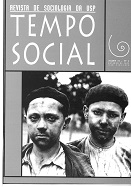Terrorismo e os atentados de 11 de setembro
DOI:
https://doi.org/10.1590/S0103-20702002000200005Palabras clave:
violência, terrorismo, poder, biopoder, cinismo, racismo, 11 de setembro de 2001Resumen
O fenômeno da fragmentação mundial produziu uma nova ordem nas relações de poder, estabelecendo uma nova tensão entre os de "cima" contra os de "baixo", verticalizando o antigo eixo geopolítico leste/oeste da Guerra Fria. Os elementos formadores das identidades oprimidas aspiram à afirmação de um modo de ser, constituindo o caráter ontológico da personalidade coletiva. Percorrer as razões teóricas que alimentam o pensamento e a ação terrorista, suas estratégias e táticas discursivas, é o objetivo desse trabalho. Uma ontologia da violência brota do interior dos conceitos foucaultianos - microfísica, biopoder, sujeito, liberdade, jogos de verdade, cinismo -, destruindo tudo com seu poder avassalador. Na nova ordem mundial, o terrorismo enquanto ação pontual é o contraponto ao poder dominante, como presença ameaçadora e difusa, agindo pela surpresa, disseminando medo e destruição por onde passa.
Descargas
Referencias
AMIS, Martin. (2001) Medo e repulsa. Folha de S. Paulo. Caderno Especial. São Paulo, 23/09, p. 1-2.
BLANC, Florent. (2001) Ben Laden et l’Amerique. Paris, Bayard.
DADOUN, Roger. (1993) La violence. Paris, Hatier.
DALLAL, Ahmad. (2001) Só democracia e riqueza derrotam os radicais do Islã. Veja. São Paulo, Abril, 1732, 26/12, p. 84-87.
D’ÁVILA, Sérgio. (2002) Ninguém sabe quantos morreram. Folha de S. Paulo. Caderno Especial, 08/09, p. 1.
FISK, Robert. (2001) O terrorista suicida veio para ficar. Folha de S. Paulo. Caderno Especial. São Paulo, 14/09, p. 19.
FLAMÍNIO PERES, Marcos. (2001) Furtado vê “nova Guerra Fria”. Folha de S. Paulo. Caderno Especial. São Paulo, 14/09, p. 18.
FOUCAULT, Michel. (1983) The Problematisation of Parrhesia. Notes to the Seminar given by Foucault at the University of California at Berkeley, ed. by J. Pearson (Archives Foucault).
FOUCAULT, Michel. (1988) A vontade de saber. 7a edição. Rio de Janeiro, Graal.
FOUCAULT, Michel. (1991a) Faire vivre et laisser mourir: la naissance du racisme. Les Temps Modernes, Paris, 525, février.
FOUCAULT, Michel. (1991b) Le courage de la vérité. Fin du cours du 8/2/1984 et début du cours du 15/02/1984 au Collège de France, 1694/1991. 1 bde.Magn. En cassette, C 69(3). Paris, Bibliothèque du Salchoir.
FOUCAULT, Michel. (1991c) Vigiar e punir. 8ª edição. Petrópolis, Vozes.
HARDT, Michael & NEGRI, Antonio. (2001) Império. Rio de Janeiro, Record.
IANNI, Octavio. (1996) A racialização do mundo. Tempo Social; Revista de Sociologia, USP; São Paulo, 8(1): 1-23, maio.
NATALI, João Batista. (2001) Terror entrou para a política com a Revolução Francesa. Folha de S.Paulo, São Paulo, 30/09, p. A21.
PFAFF, William. (2001) Três lições para os Estados Unidos. Folha de S. Paulo. Caderno Especial. São Paulo, 14/09, p. 4.
RUSHDIE, Salman. (2002) Antiamericanismo exige olhar sóbrio dos EUA. Folha de S.Paulo. Caderno Especial. São Paulo, 01/09, p. 9.
MAXWELL, Keneth. (2002) Novo terrorismo é incontrolável. Entrevista a Maurício Santana Dias. Folha de S. Paulo. Caderno Especial. São Paulo, 13/09, p. 19.
SANTOS, J. F. (1994) O que é Pós-Moderno. São Paulo, Brasiliense.
TAHERI, Amir. (2001) O ódio dos muçulmanos ao ocidente é cultivado por governos e imprensa. Veja. São Paulo, Ed. Abril, 1732, 26/12, p. 70-73.
WELLAUSEN, Saly. (1996) Michel Foucault: parrhesia e cinismo. Tempo Social, SãoPaulo, 8(1): 113-125, maio.
WELLAUSEN, Saly. (1993) A liberdade no pensamento de Michel Foucault. São Paulo, 191p. Tese (Doutorado). Faculdade de Filosofia, Letras e Ciências Humanas da Universidade de São Paulo.
WORLD MEDIA. (1990) A nova desordem mundial 1, 2, 3. Folha de S. Paulo. São Paulo, 19-20-21/12.
Descargas
Publicado
Número
Sección
Licencia
Derechos de autor 2015 Tempo Social

Esta obra está bajo una licencia internacional Creative Commons Atribución-NoComercial 4.0.


